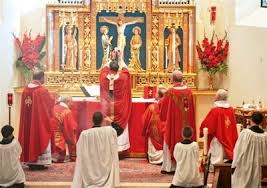St. John Chrysostom wrote: “When Mass is being celebrated, the sanctuary is filled with countless angels who adore the Divine Victim immolated on the altar.” St. Augustine taught that “the angels surround and help the priest when he is celebrating Mass.” The entire company of angels must be weeping with unrestrained sorrow at this time as the Bride of Christ, the Catholic Church, stands empty all over the world, unable to glorify God publicly in the Holy Sacrifice of the Mass.
A great grace during this time when our churches are shuttered is the rare opportunity to participate in person at Mass. This gift was given to me recently I believe as consolation for heartfelt frustration and ache caused by the prohibition of public worship and locked-out churches. St. Jean Vianney believed that “happy is the guardian angel who accompanies a soul to Holy Mass.” My guardian angel must have been elated and likely worked diligently to protect me as I drove the fair distance to Mass in the early morning.
Veiling my head before entering the church, I wondered if I was experiencing in part what persecuted Christians through the ages, forbidden to worship openly know only too well. For the very small group of us that day, we had to be mindful of pandemic watchdogs lurking unseen who would have been on the lookout for real or imagined breaches in social distancing and gathering rules imposed by church authorities as well as the state.
The exceedingly small group of worshippers scattered throughout the church knelt reverently – and I’m certain, with profound gratitude – as Father whispered the solemn prayers of the Traditional Latin Mass. As the early morning light streamed through the stained glass windows, the significance of what was happening at the altar commanded our attention. There was beauty in the long-standing prayers of the usus antiquior, in the deliberate actions of the priest, in the sacred vestments, prayer cards, vessels, linens, candles that adorned the traditional altar. There was power in the slow, quiet rhythm of the Mass. The angels surrounding the sanctuary must have burst with joy.
Praying in the universal language of the Church amongst this tiny band of believers, I thought that this is what Mass should be, not just in the Extraordinary Form but at every Mass: holy worship devoid of noise, egos, extra “ministers”, but steeped in the beauty of the church that points us to the Father with sound Catholic teaching that edifies and consoles. And if there were music, they would be the chants and hymns that befit the singular significance of the Holy Sacrifice. Stripped down to the essential elements of the Mass, our attention remains on the representation of Our Lord’s ultimate sacrifice at the altar.
Because we are human, we often take the Holy Mass for granted. We see It as a right that we squander and not as a treasure to be cherished and protected. We may show up in body but not always in mind and spirit. May the prohibition of public Masses and inaccessible churches in many parts of the world during this pandemic cure us of our complacency. Absence, it is said, makes the heart grow fonder; therefore, our hearts ought to be straining to the limit with greater yearning towards Our Lord in the Blessed Sacrament.
For those of us who have been given the grace of participating in person at Mass during this time, the gift is not ours to hoard. We are tasked with bringing this precious gift to the world with our lives hidden in Christ by our prayers, words, and actions.
This separation we are currently enduring from publicly offered Mass will not last forever. But the longing that we now feel for Christ in the Blessed Sacrament should be a constant reminder of what we possess in Holy Mother Church: the One True Faith instituted by Christ for the salvation of the world. May we always cherish, uphold and guard Her, bringing Her Good News of truth and charity to a world in need.
“From this moment on, live the Eucharist fully; be persons for whom the Holy Mass, Communion and Eucharistic Adoration are the center and summit of their whole life.” (Pope St. John Paul II)


